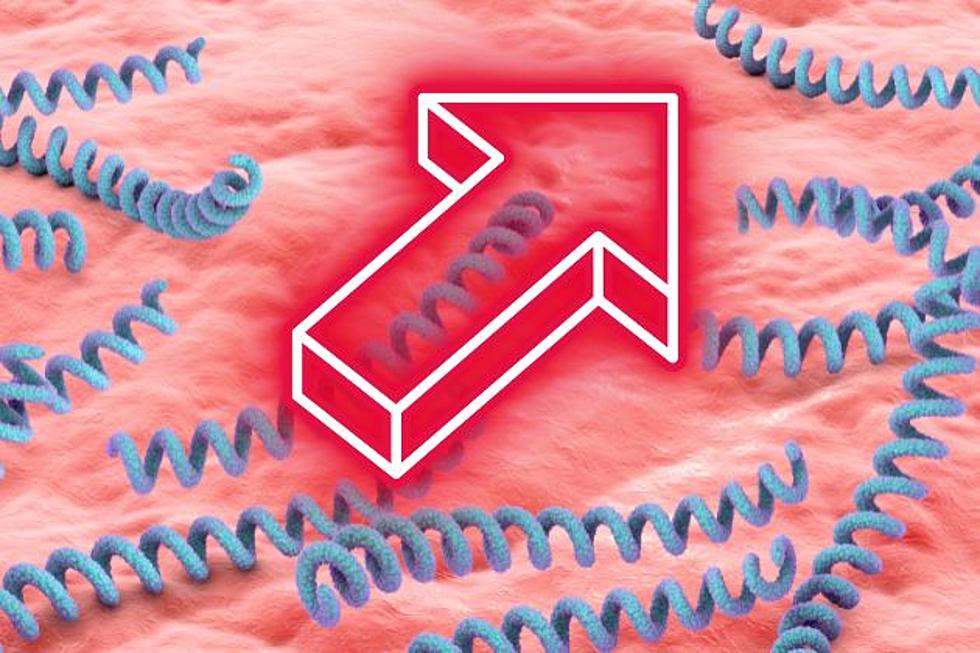
NJ records big spike in dangerous sexually transmitted infection
⚫ The latest NJ statistics follow a concerning national trend
⚫ Babies are coming out of the womb infected
⚫ Advocates believe COVID postponed routine health care
The rate of syphilis cases in New Jersey has nearly doubled in four years.
Experts are hyper-focused on syphilis due to its exponential growth compared to other sexually transmitted infections.
Nationwide, syphilis cases have shot up by 80%.
According to the newest figures from the Centers for Disease Control and Prevention, the Garden State recorded 1,018 new cases of syphilis in 2022 (a rate of 11 cases per 100,000 people).
In 2022, according to the CDC, New Jersey also recorded 48 cases of congenital syphilis (passed from mother to baby).
"The concerning rise in syphilis cases could be attributed to the COVID-19 pandemic, when many people postponed accessing routine health care," said Elizabeth Talmont, chief projects officer for Planned Parenthood of Northern, Central, and Southern New Jersey.
Stigma is an additional barrier, Talmont said. It can prevent open dialogue around testing services, or prevent dialogue between sexual partners.
In 2023, the agency provided more than 125,000 tests for sexually transmitted infections, including syphilis.
"We want to reduce the stigma," she said. "We want to increase access so that people get the testing and treatment that they may need."
What is syphilis?
Syphilis can cause serious health problems without treatment. There are four stages of syphilis.
Primary Stage symptoms
You may develop a painless sore in the area where syphilis entered your body, usually the gentials, anus or mouth. The sore lasts three to six weeks but you must get treated even though the sore goes away on its own.
Secondary Stage symptoms
Rashes and sores may develop in the genitals, anus or mouth as well as the palms of hands and soles of feet. Like the primary stage sores, these will not itch or hurt and may be too faint to sometimes see. You must get treated even though these rashes and sores go away.
Latent Stage symptoms
No symptoms are visible during this stage, which can last years as syphilis remains in your body.
Tertiary Stage symptoms
If untreated, syphilis can be dangerous and deadly. After 10 to 30 years, it may start to affect organs such as the heart and brain as well as blood vessels and the nervous system.
Syphilis prevention and treatment
Syphilis, like all sexually transmitted infections, is treatable. A single injection of a long-acting medication can cure its early stages, but additional injections may be needed if the infection is caught later on.
While advocates say the only way to completely avoid syphilis and other sexually transmitted infections is by not having sex (including oral) altogether, they note that people who are sexually active can protect themselves by using a condom properly during intercourse, or by being in a long-term monogamous relationship with a partner who has been tested and does not have syphilis.
And a relatively new development allows sexually active individuals to reduce their risk for infection after unprotected sex. A single dose of antibiotic within 72 hours of the sexual activity can dramatically cut one's risk.
"We do want to catch it early, and we're particularly concerned about patients who are pregnant and are continuing those pregnancies," Talmont said.
According to the CDC, nearly 90% of congenital syphilis cases in 2022 might have been prevented with timely testing and treatment during pregnancy.
The CDC recommends that all pregnant women be tested for syphilis during their first prenatal visit.
"Many people with syphilis do not have any symptoms," the CDC said. "Also, syphilis symptoms may be very mild, or be similar to signs of other health problems. The only way to know for sure if you have syphilis is to get tested."
NJ towns with the highest rates of STDs in 2022
Gallery Credit: New Jersey 101.5
Report a correction 👈 | 👉 Contact our newsroom
Top 30 schools most violent schools in New Jersey
Gallery Credit: New Jersey 101.5
Restaurants that closed in New Jersey During 2023
Gallery Credit: Dan Alexander



